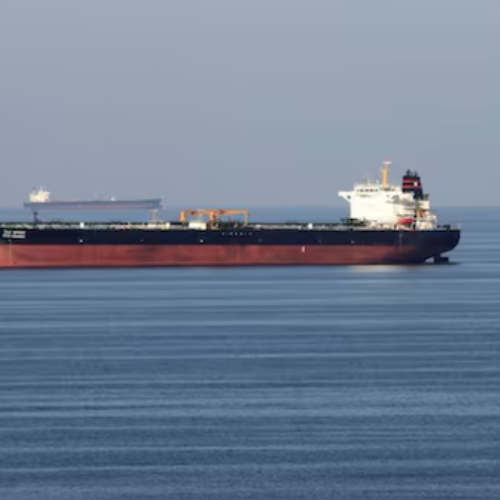The United States recently imposed sanctions on 35 entities and vessels, including two companies from India, for transporting Iranian Oil to other countries. This action is part of the US’s ongoing efforts to target Iran’s oil exports, which the US believes are being used to fund Iran’s nuclear program and support regional terrorism. These sanctions have caused a stir in the international shipping industry and are an important step in America’s strategy to disrupt Iran’s illegal oil trade.
Sanctions on Companies and Vessels
The US Department of the Treasury announced that it had placed sanctions on 35 entities, including shipping companies and vessels, for their role in moving Iranian oil. Among those sanctioned are two India-based companies: Vision Ship Management LLP and Tightship Shipping Management (OPC) Private Limited. Both companies have been involved in transporting oil from Iran, violating US sanctions that prohibit such activities.
Vision Ship Management LLP manages and operates several vessels, including the PHONIX, which has been used to transport Iranian crude oil. The company has been involved in transporting millions of barrels of Iranian oil since 2022. Another vessel operated by Vision Ship Management, the RIO NAPO, carried Iranian naphtha worth approximately $21.5 million to the United Arab Emirates (UAE). The Treasury also mentioned that the company has a third vessel, the Panama-flagged LARA II, which has been linked to transporting Iranian oil as well.
US Sanctions Indian Gabbaro Ship Services for Role in Secret Iranian Oil Trade
Tightship Shipping Management (OPC) Private Limited has also been accused of managing multiple vessels that transported Iranian oil. Among these are the OLIVE, BLACK PANTHER, and LIONESS, all of which have been linked to carrying Iranian oil for the National Iranian Oil Company (NIOC). These vessels have reportedly moved tens of millions of dollars’ worth of oil since at least 2022. The BLACK PANTHER, in particular, is said to have engaged in ship-to-ship transfers of Iranian oil, a practice that helps conceal the origin of the oil and avoid detection by authorities.
The Role of the Shadow Fleet
The US Treasury is focused on disrupting what it calls Iran’s “shadow fleet”—a network of vessels that secretly transport Iranian oil to bypass international sanctions. These ships are not flagged under Iran’s name but instead use various flags from other countries to hide their true origin. Some of the vessels linked to the sanctions are flagged in countries like Panama, Cook Islands, and the UAE, which are commonly used to disguise the identity of ships involved in illicit oil trade.
One notable vessel linked to Tightship Shipping Management is the Panama-flagged TONIL, which has been involved in transporting Iranian oil. This vessel was also under the management of Ukraine-based Lightship Management Ltd, another company sanctioned by the US. According to the Treasury, the TONIL has been carrying millions of barrels of Iranian oil while evading sanctions. The US is targeting these entities for operating in the petroleum sector of Iran’s economy, which is a crucial source of income for the Iranian government.
The United States has made it clear that it will continue to target entities and vessels involved in Iran’s oil trade. This includes going after companies that help Iran sell oil illegally, even if those companies are based in other countries. The goal is to reduce Iran’s revenue from oil exports, which the US believes is used to fund Iran’s nuclear ambitions and military activities in the region.
Iran to Boost Uranium Enrichment Capacity: IAEA Report Details New Plans
Iranian Oil and Its Impact
Iran’s oil trade has been under intense scrutiny by the US and other nations for years. Oil sales are a significant source of income for Iran’s government, and the US argues that these funds are used to support various activities that threaten regional stability. For example, the US claims that Iran uses its oil revenues to develop advanced weapons, such as drones and missiles, and to support proxy groups in the Middle East that engage in acts of terrorism.
The US sanctions aim to cut off these financial resources and prevent Iran from further developing its nuclear program. In a recent statement, the Treasury emphasized that Iran continues to funnel money from its oil trade into these dangerous activities, which contribute to the destabilization of the region. By targeting the companies and vessels involved in this illicit trade, the US hopes to weaken Iran’s ability to fund these activities and pressure the country into complying with international demands.
The sanctions on these 35 entities and vessels are just the latest in a series of measures taken by the US to disrupt Iran’s petroleum sector. As the US continues to enforce these sanctions, the pressure on Iran to change its policies will likely increase. However, this strategy has also raised tensions with countries that rely on Iranian oil, and it remains to be seen how effective it will be in achieving its goals. For now, these sanctions serve as a clear message from the US to those involved in Iran’s oil trade: breaking sanctions comes with significant consequences.


